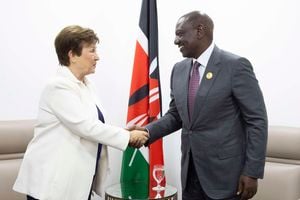
Former Nyeri Posta and Kenya volleyball player Moses Wathi during an interview with Nation Sport at Giakanja in Nyeri on October 14, 2020.
| Joseph Kanyi | Nation Media GroupSports
Premium
Moses Wathi: How forgotten volleyball hero fell from grace to grass
What you need to know:
- Wathi's tall and spindly figure belies the stinging attacks and monster blocks that characterised his game during his heydays in the 90s
- In his first season in 1993, he was called up to the national team for the Africa Cup of Nations in Algeria and surprisingly he made the final squad of 12
- Things got even worse when he was forced to early retirement in 2006 after being retrenched by his employer Nyeri Posta
Standing at 6ft 7in, it's difficult not to notice Moses “Gosko” Wathi but nowadays he is rarely recognised while strolling through Giakanja, a small town in Nyeri County once considered the hotbed of volleyball talent in Central Kenya.
Twenty-five years ago this would not have been possible. At his peak, Wathi was easily one of the best middle blockers that Kenya has ever produced. He was the darling of volleyball fans in Nyeri and Giakanja, where he was a cult hero in his youth. His spindly figure belies the stinging attacks and monster blocks that characterised his game during his heydays in the 90s, a gem of a middle blocker that any coach would have loved to have in his team.
But a lot has changed since Wathi last played volleyball; Nyeri is no longer a district but has expanded its borders and is now a county, the official competition ball is not MVA 210 but V200W from renowned sports manufacturer Mikasa, volleyball is no longer a hobby but a well-paying profession, Giakanja grounds - renowned for hosting top notch volleyballers - now houses a police station with the remaining space being a dusty volleyball court that doubles up as a parking lot for the men in uniform.
Despite the lack of attention from Giakanja residents and volleyball fans of yesteryear, Wathi still calls this place home. It’s where he lives even though he doesn’t lead the life he would want. In his own words: “Life has become very tough, I take a day at a time.”
Footballer-turned-volleyballer
When we arrive for this interview, we find Wathi fetching water from a yellow 20-litre jerrycan into a big red mug at one corner of “Kool Kinyozi”, a tiny single-room barber shop at the heart of Giakanja town.
With only two raised wooden seats positioned at the middle, a bench next to the wall near the entrance, a rectangular mirror on the opposite wall and an old-fashioned cassette radio, this is the only place that provides the ambience and company that Wathi silently craves in these tough days of his life.
On his left hand is a small black carrier bag with Khat (muguka) prominently sticking out their green leafy heads and a small packet of groundnuts, a common accompaniment for anyone who uses this drug.
It’s almost 4.30pm and as per routine this is the time he submerges himself into chewing muguka perhaps to forget about the frustrations of life. How could life change so fast for a superstar? Just the other day, he was making endless trips to Nairobi for national team duty. He even travelled to Tunisia for the Africa Club Championships while playing for Nyeri Posta Volleyball Club.
Born in Wamagana, Nyeri County in 1970, Wathi spent his early years as a footballer before he began his love-hate affair with volleyball in 1986 while in Form One at Giakanja Boys Secondary School.

Former Nyeri Posta and Kenya volleyball player Moses Wathi during an interview with Nation Sport at Giakanja in Nyeri on October 14, 2020.
“I had played football in primary school so I wanted to continue with it in secondary but our Games Master (John Gitahi) who doubled up as the volleyball coach liked my height and told me to switch to volleyball,” recalls Wathi, as he begins chewing a leaf after another, his long legs well rested on the raised wooden chair next to the mirror.
“It took me two years to break into the first team since Giakanja had a very strong team. I had developed confidence and was now starting to make a name for myself since secondary school volleyball was very competitive those days,” he adds.
Even though Giakanja did not qualify for the national secondary school competitions during his four-year stay, Wathi had done enough to convince then Ministry of Works (MoW) coach Cyrus Kimamo to sign him. He trained with the team for a year before graduating into the first six in 1991. But it wasn’t long before he outgrew MoW and joined neighbours and rivals Nyeri Posta.
Dropped at airport
It’s Anthony “Soldier” Ndegwa, then a player-coach, who lured him to Nyeri Posta which was the pride of Nyeri Town and Central Province by extension. Nyeri Posta had a star-studded team that boasted big names in almost all positions: Cyrus Murage, Stephen "Kaboko" Ritho, Eliud “Alpha” Ndirangu, Nicodemus “Mbaka” Wang’ondu, Charles “Cuban” Matimu, Paul Ngari and Joseph Macharia.

Nyeri Posta's Moses Wathi shakes hands with Minister of Transport and Communication John Michuki during Kenya Communications Sports Organisation (KECOSO) games held in Nyeri in early 2000s.
Winning was a habit for Nyeri Posta and they rubbed it off their new acquisition Wathi. In his first season in 1993, he was called up to the national team for the Africa Cup of Nations in Algeria and surprisingly he made the final squad of 12. With the team’s flight having been booked at night, Wathi left camp in Nairobi early that morning and travelled to Nyeri, 152 kilometres from the capital, to bid his family and friends goodbye ahead of his first trip abroad. But it was not to be.
“We were told that there were few tickets and therefore we could not travel all of us. I was dropped at the airport since Posta had not provided my ticket. It was so painful since I was in very good shape and form,” Wathi explains, hand in mouth, as he rolls his brown teary eyes. “The problem was that officials had a bigger say in team selection than the coach.”
Current Kenya women’s volleyball team coach Paul Bitok, who was among the seven players who travelled to Algiers that night, recalls the sacrifice Wathi had made to arrive in Nairobi in good time for departure.
“Wathi had to take a taxi back to the city from Nyeri to Nairobi to avoid any inconvenience. Taxis were very expensive those days. He arrived in Nairobi just in time for the team’s departure. We met at New Stanley hotel and proceeded to JKIA. But when we arrived at the airport coach (Sylvester) Kioko was asked to further trim his squad to seven since air tickets were not enough,” Bitok told Nation Sport.
“Surprisingly, General Service Unit (GSU) had provided the federation with one ticket and so they had to have a player in the team. Since we didn’t have a middle blocker in the team, we had to pick one from GSU and that is how Wanjohi made the trip. He had not even trained with the national team before,” explains Bitok with a light chuckle.
David “Demosh” Lung’aho, Patrick Owino, Godfrey Owese, Philip Wanjohi (R.I.P), Paul Bitok, Fanuel Ajula (R.I.P) and Joseph Waiganjo were the seven players who made the trip to Algiers where Kenya lost all her matches.
Best blocker award
Disappointed, Wathi returned to Nyeri the following day to his club and employer Nyeri Posta.
Alongside Murage they formed a deadly combination in the middle that was a nightmare for their opponents. Nyeri Posta won the national league in 1994 and represented Kenya at the Africa Club Championships in Tunisia in 1995.
As the Nyeri-based club became a dominant force in Kenyan volleyball, Wathi also enhanced his reputation as a reliable blocker. In 1996 during the end of season play-offs, he seized the perfect opportunity to serve a reminder to national team selectors of his talents.
Nyeri’s Kamukunji grounds hosted the end of season play-offs and the men’s final was between rivals Nyeri Posta and Nairobi Posta. On the opposite side were Paul Bitok, Sammy Kirongo, Abdul Muge, John Mwaniki et al. Then the hosts had the usual suspects Matimu, Wathi, Murage, Ndegwa.
A five-set thriller that lasted over three hours saw Nairobi Posta carry the day 3-2 and book a ticket to the 1997 Africa Club Championships. But it was what transpired before the match that remains etched in Wathi’s mind.

Moses Wathi (right) of Nyeri Posta in action against Ulinzi during a league match in this undated photo.
With the ground fully packed, the VIP dais at Kamukunji came down tumbling as fans went wild just at the sight of these two rivals warming up. A few officials seated at the dais were injured and attended to by first aiders before the tense match served off. Wathi, who was unplayable on the day, was named best blocker in the national league that year.
“The only way I could prove I was good enough to play for the national team was during league matches. Giving Nairobi Posta a run for their money was a big statement from us since they formed the bulk of the national team. That was my highest moment in my career,” recalls Wathi as he sips water to hydrate his dry verdant lips.
In between his highest and lowest moments in the sport, there were national team call ups but it always ended there. The caps remained elusive and Wathi slipped into a new addiction to wash away his sorrows; chewing khat.
“I knew the selection wasn’t going to be transparent so I just used to report to camp as a formality - to honour the release I had been given by my employer to report for national duty. The officials used to say I’m indiscipline ‘anakula miraa chini ya stairs wengine wakikimbia (he is chewing Khat under the stairs as others warm up)’. The truth is that I had given up because no matter how good I was the coach was never going to have a free hand in selection,” opens up Wathi, who says Julius Musyimi as the best coach he worked with.
Bitok, who had professional stints in Tunisia and Croatia, played with Wathi in the national team and at Posta during Kenya Communications Sports Organisations (KECOSO) games. He believes frustrations robbed Kenya of a “top talent and amiable character.”
“He went through a lot of frustrations but he was a very good blocker – the best of our generation. He had very good timing in blocks and he was also good at attacking quick balls through the middle. There is a technique I copied from him, he could deceive blockers by angling his body in one direction and using just his wrist to snap the ball in the opposite direction. It was very difficult to block him,” Bitok said before revealing another side of Wathi.
“He was unique because back then there used to be big rivalry between players from Nairobi Posta and Nyeri Posta. Some players never used to talk to each other but Wathi had a unique way of bringing us together. He was a story teller and an entertainer in the national team.”

Moses Wathi (squatting, first from left) poses for a photo with Nairobi Posta players after he had been invited to beef up their team ahead of Africa Club Championships.
As Wathi’s best years passed by, younger talents - Laban Bor, David Opiyo, Sila Makiso - started knocking at the doors of the national team and his call-ups dried up. Things got even worse when he was forced to early retirement in 2006 after being retrenched by his employer Nyeri Posta.
Menial jobs
He spent his retirement package on buying a piece of land in Kagwathii village and built a home where he lives to date. Fast forward, 14 years after his retirement, Wathi is a shell of his former self struggling to make ends meet.
“I don’t think I squandered my (retirement) money. I bought land and built a house for my family. Life has become very difficult because I still have a family to take care of but I don’t have consistent income. When I was employed I was assured of a salary at the end of the month but now I have nothing,” said the father of three daughters – Doreen Wambui (20), Susan Muthoni (16) and Winfred Wanjiru (11).
“I come to Giakanja to look for menial jobs. If I’m lucky to find something well and good, if I’m not then I just sit here with my friends and we console each other until the day ends,” said Wathi.
“I’m really suffering and I’m not in a position to cater for my children’s education. My first born should be joining university this year and I can’t figure out how to raise her fees. I still love volleyball and I can impart my knowledge on the current generation as a coach. Sometimes I watch people play here at Giakanja and I can see that the standards have gone down. There is no power and the passion is lacking,” noted Wathi.

Former Nyeri Posta and Kenya volleyball player Moses Wathi during an interview with Nation Sport at Giakanja in Nyeri on October 14, 2020.
“Our careers were ended unceremoniously, it’s like we were kicked out of the game but I believe I can still offer something if given a chance,” says Wathi, as he massages his grey unkempt goatee.
David Thuita, currently attached to Kenya Ports Authority, says he was inspired by Wathi to play volleyball. Growing up in Giakanja as a child, he watched Wathi play and this stirred his passion for the sport.
“Wathi was a very good player and I was their ball boy when they used to play. It’s a pity life has turned out this way for one of my role models because it becomes very difficult to convince young players to take up volleyball seriously when they see what has become of our legends,” said Thuita, who also had a professional stint with Rwanda’s APR.
Unrewarding career
As we conclude this interview, we offer Wathi a ride in Nation’s double cabin pick-up as we head for a meal at Tumu’s Restaurant across the Nyeri-Othaya road. He beams with joy at that moment of recognition and sits at the back left, lowers his window pane to shoulder level and waves at the small crowd gathered along the road, almost the way politicians do it.
One lady shouts in local dialect: “Wathi, umuthi ugukoma na iratu (Wathi, today you will sleep with your shoes on).” Enchanted, he responds with a wide smile as we take off to Tumu’s.

Clockwise from left: Nation Sport's reporter Samuel Gacharira, former Nyeri Posta middle blocker Moses Wathi, former Nyeri Posta setter Nicodemus Wang'ondu and photographer Joseph Kanyi share a meal at Tumu's Restaurant in Giakanja, Nyeri on October 14, 2020.
At Tumu’s, Wathi prefers to eat bomb (a bomb-shaped delicacy made from minced goat intestines) with ugali as the rest of us devour goat meat. His former teammate at Nyeri Posta, Wang’ondu – who played a big role in organising this interview - jokes that Wathi’s teeth have become too weak due to his addiction to Khat.
And he agrees: “I can only take soft food nowadays since my teeth can barely chew.” A few bites later, he says he can’t have more.
After finishing our meal, it’s now dusk at Giakanja and we have to leave. Before saying good bye, Wathi spares some advice to current players.
“I would like to urge players to embrace education because sports is an unrewarding career in Kenya. It is very short and you can be forced to retire early even due to injury. Spend your little earnings on a course that can give you a job after you stop playing,” said the 50-year-old in a deep tone.
As we depart, Wathi takes a long lonely walk back to his favourite chilling spot, Kool Kinyozi. Nobody notices him as he crosses the Nyeri-Othaya road, the crowd that had gathered there around 30 minutes ago has since dispersed. Everything is back to normal at Giakanja but for Wathi life has never been the same again since he retired.

Former Nyeri Posta and Kenya volleyball player Moses Wathi during an interview with Nation Sport at Giakanja in Nyeri on October 14, 2020.
On this day, as has become routine, he will stay at Kool Kinyozi to chew muguka probably till late in the night but this should be be case for someone of his stature: a living legend, an exceptional talent with over 25 years of volleyball experience wasting away.
“Players like Wathi, Soldier (Anthony Ndegwa) and (Jane) Wacu were world class talents. It shows that there is still big potential in Nyeri. The Nyeri County Government should engage legends of the game to help assemble a team that can participate in the league and revive volleyball in Nyeri,” advised Bitok, who guided Kenya back to the Olympics in January after a 16-year hiatus.
But until then, who will save Moses Wathi? Truly, a prophet is not recognised in his own land.




